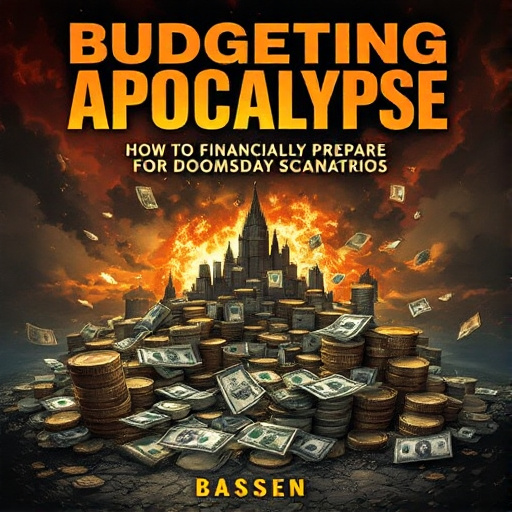Featured Articles
- 7 Must-Have Meal Prep Containers Tested for Durability and Cost Efficiency in Everyday Use
- Beyond Dollars: Unconventional Budgeting Techniques from Ancient Civilizations to Modern Minimalism
- Budgeting for Pets: Unleashing Savings on Pet Care Without Sacrificing Love or Quality
- Budgeting for the Apocalypse: How to Financially Prepare for Doomsday Scenarios
- "Budgeting for the Unconventional: How to Save While Embracing Minimalist Travel Adventures"
Budgeting in the Age of AI: How Tech Can Transform Your Savings Strategy for 2024 and Beyond
Budgeting in the Age of AI: How Tech Can Transform Your Savings Strategy for 2024 and Beyond
Budgeting has always been essential for financial health, but with the rise of AI technology, it can now be easier and more efficient than ever before. This article will explore how AI can revolutionize your savings strategy in 2024 and beyond, offering unique insights, practical tips, and real-life examples.
A New Era of Budgeting
Gone are the days of manually jotting down expenses in a ledger or creating tedious spreadsheets. With the encroachment of AI, budgeting is evolving into a smart, automated process that can significantly enhance your financial decision-making—from identifying spending habits to predicting future expenses. According to a study by McKinsey, AI could potentially add $13 trillion to global economic output by 2030, with personal finance being a substantial contributor.
Meet Your AI Assistant
Imagine having a virtual assistant that not only alerts you about irregular spending patterns but also suggests changes to optimize your savings. Apps like Mint and Cleo are already harnessing AI to help users manage their finances effortlessly. For instance, Cleo engages users with its witty, conversational interface, making budgeting feel more like a chat with a friend than a chore.
The Power of Predictive Analytics
One of the most fascinating aspects of AI in budgeting is its ability to harness predictive analytics. As a 26-year-old finance enthusiast, I can attest that understanding future cash flow is critical. AI models can analyze your past spending data and recognize patterns, forecasting your future expenditures. This predictive aspect helps individuals adjust their budgets proactively instead of reactively—an absolute game-changer.
Real-life Example: How Alex Saved $4,000 in 2022
Consider the story of Alex, a 30-year-old tech consultant who struggled with overspending on dining out. After downloading an AI-driven budgeting app, Alex received alerts about his excessive expenses in the dining category. The app frequently suggested cost-effective meal-planning strategies tailored to his tastes. By following these suggestions, Alex successfully saved over $4,000 in 2022—a huge win for any young professional!
Getting Creative: Gamification of Savings
When was the last time you genuinely enjoyed budgeting? Enter the concept of gamification. Apps like Qapital and YNAB (You Need a Budget) have turned financial management into an engaging game. Users can set specific savings goals—like a vacation fund or a new gadget—and earn rewards for sticking to their budgets.
Statistics That Matter
Did you know that nearly 60% of Americans do not follow a budget? According to a 2023 study by the National Endowment for Financial Education, the need for efficient, enjoyable budgeting solutions has never been more critical. By gamifying their savings experience, individuals can boost their engagement and commitment to reaching financial goals.
Case Study: A Family Transformation
Meet the Romeros, a family of four who transformed their financial situation by incorporating gamification into their savings plan. Motivated by a dream trip to Disneyland, they utilized a popular budgeting app that rewarded consistent saving with points. By the end of six months, not only had they saved the $5,000 they needed, but they also found joy in the process of saving as a family.
The Role of Personal Finance Education
Let's face it: financial literacy is not always at the forefront of our education systems. As an 18-year-old fresh out of high school, I wish I had received more guidance on personal finance. Thankfully, with AI apps offering instant resources and information, anyone can turn their financial knowledge around.
Expanding Your Financial Literacy
Some modern budgeting applications have integrated educational content within their interfaces. For example, apps like Albert offer tips, articles, and resources tailored to your financial situation. This not only aids immediate budgeting needs but also empowers users to become wiser financial managers in the long run.
The Future: AI-Driven Customization
What if your budgeting app could develop an entirely personalized plan based solely on your spending habits and financial goals? That’s the promise of future AI integrations. Already, companies are investing in AI solutions that allow apps to cohort users and offer tailored suggestions reflecting their individual financial positions.
Example: The Budgeting App That Knows You
Take a look at apps like Personal Capital, which use artificial intelligence to analyze your investment portfolio and overall financial health. Imagine their technology not only simplifying your budget but also optimizing your investment strategies based on your unique spending patterns! The capabilities are vast, and the convenience is undeniable.
Overcoming Psychological Barriers
For many, financial decisions are not merely about numbers—they're deeply emotional. Fear, anxiety, and even denial can cripple our budgeting efforts. AI’s empathetic design can help mitigate these emotional barriers by offering gentle nudges rather than harsh critiques.
A Psychological Approach to Budgeting
According to a psychological study published in the Journal of Behavioral Finance in 2022, gamified savings apps significantly reduce anxiety associated with financial planning. By reframing the budgeting process, AI can help individuals view their financial situations with optimism instead of dread. The words of a 45-year-old financial coach, Maria, resound: "Budgeting should feel empowering, not limiting!"
Broadening Accessibility
AI-powered budgeting tools are increasingly becoming accessible for everyone—even those with limited financial literacy. With user-friendly interfaces and intuitive designs, even a 16-year-old beginner can navigate a budgeting platform effectively. It bridges the gap between financial novices and experts.
Addressing the Next Generation
As teenagers continue to enter the world of personal finance, harnessing the benefits of AI-driven budgeting can set them firmly on the right financial footing. High school students can leverage these tools, fostering financial literacy from a young age. In a 2023 survey, 70% of students reported using a financial app at least once, highlighting how normalized budgeting technology is becoming.
Ethics and Privacy Concerns
With great power comes great responsibility. As we move towards increasing reliance on AI in personal finance, ethical concerns arise, particularly regarding data privacy. Over 73% of adults worry about the safety of their financial data, according to a recent PR Newswire survey. Transparency and security protocols should be top priorities for developers of these technologies.
Staying Informed and Safe
To maintain trust, aspiring AI budgeting platforms must prioritize data encryption and offer clear opt-in policies. Users should always be educated about their privacy rights and the importance of choosing reputable platforms. As a 36-year-old tech-savvy individual, I cannot stress the importance of reviewing app permissions before diving in.
Conclusion: Embracing the Future
In conclusion, as we usher in 2024, it is clear that AI is set to revolutionize how we budget and save. From predictive analytics to gamification and beyond, technology offers a plethora of tools to enhance financial literacy and empower users. Whether you’re a teenager just starting or a seasoned saver, incorporating these AI-driven strategies could profoundly impact your financial future.
So go ahead: embrace these innovations. The road to effective budgeting in the age of AI is paved with excitement and potential—let's embark on this journey together!




